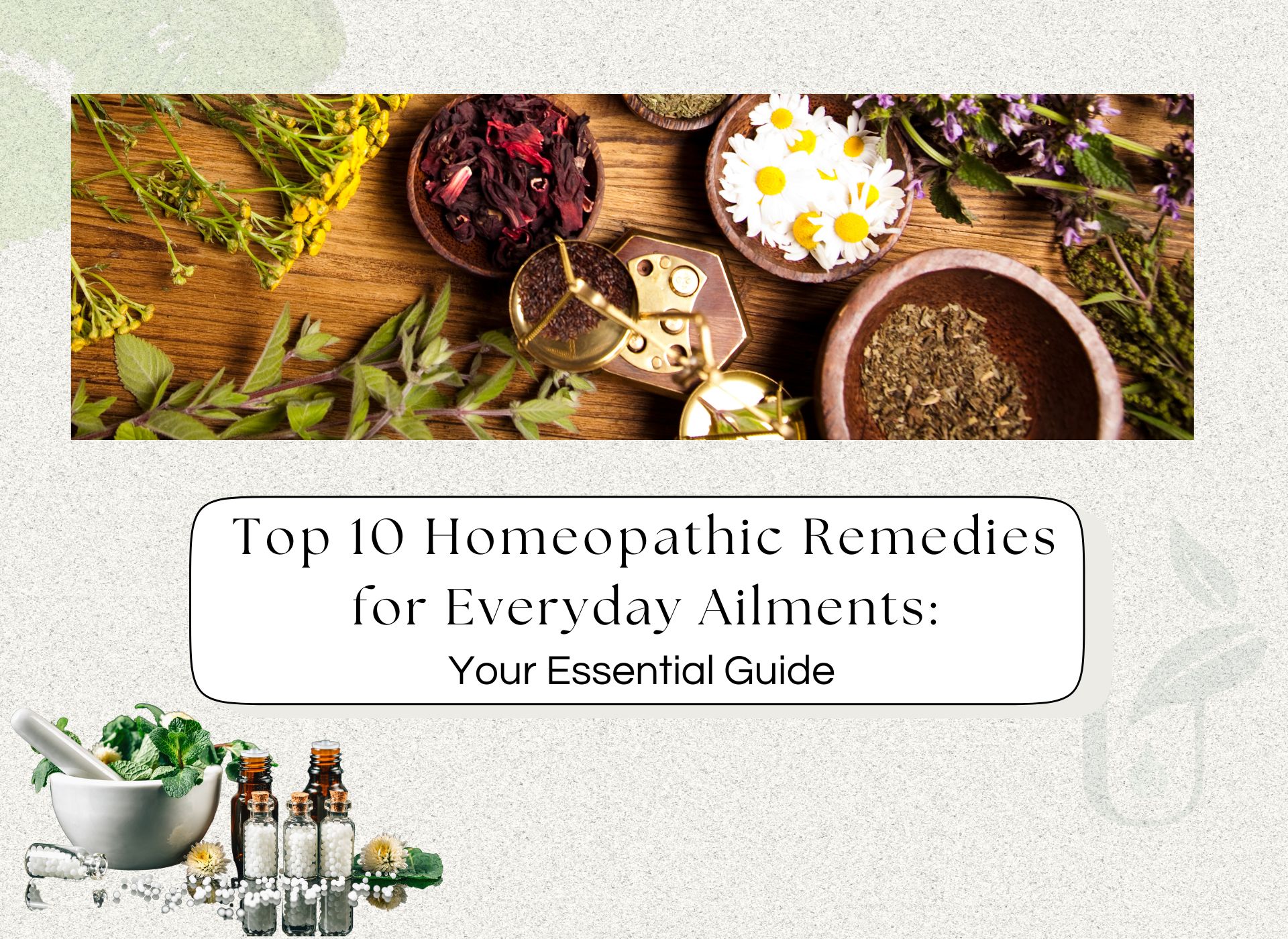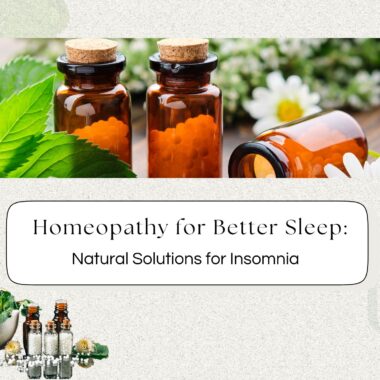Introduction: The Power of Homeopathy
Homeopathy, a system of alternative medicine founded by Dr. Samuel Hahnemann in the late 18th century, has stood the test of time due to its holistic approach to health. By treating the individual as a whole rather than just symptoms, homeopathy aims to stimulate the body’s innate healing abilities.. This gentle and natural form of medicine is particularly effective for managing common, everyday ailments.
In this comprehensive guide, we’ll explore the top 10 homeopathic remedies for common conditions, focusing on their uses, benefits, and tips for proper application. Whether you’re new to homeopathy or a seasoned practitioner, this guide will provide valuable insights to enhance your wellness journey.
Why Choose Homeopathic Remedies?
Homeopathy offers a variety of advantages over conventional treatments:
- Gentle and Safe: Homeopathic remedies are derived from natural substances, making them safe for all ages, including children and pregnant women.
- Holistic Healing: Focuses on the root cause of ailments, addressing physical, emotional, and mental well-being.
- Minimal Side Effects: Since remedies are highly diluted, they are generally free from adverse effects when used correctly.
- Cost-effective: Homeopathic treatments are often more affordable than conventional medicines.
1. Arnica Montana
Best for: Bruises, muscle soreness, and injuries
Benefits:
- Reduces pain and inflammation
- Speeds up the healing process
- Effective for physical trauma, including sports injuries
Usage Tip: Take Arnica immediately after injury for best results. Available in gel, cream, and tablet forms.
2. Nux Vomica
Best for: Digestive issues, hangovers, and stress-related symptoms
Benefits:
- Relieves indigestion and bloating
- Eases nausea and headaches
- Reduces irritability and stress-induced discomfort
Usage Tip: Ideal for individuals who experience symptoms due to overindulgence in food or alcohol.
3. Apis Mellifica
Best for: Bee stings, insect bites, and allergic reactions
Benefits:
- Reduces swelling and inflammation
- Eases burning, stinging pains
- Effective for hives and skin rashes
Usage Tip: Apply topically or take orally for immediate relief from insect bites.
4. Belladonna
Best for: High fevers, acute inflammation, and headaches
Benefits:
- Alleviates intense throbbing headaches
- Reduces fever and redness
- Calms sudden, intense symptoms
Usage Tip: Effective when symptoms appear suddenly and intensely, often with a high fever.
5. Calendula Officinalis
Best for: Skin injuries, cuts, and burns
Benefits:
- Promotes wound healing
- Reduces pain and prevents infection
- Soothes irritated or inflamed skin
Usage Tip: Apply Calendula ointment directly to cuts or minor burns. It’s gentle enough for sensitive skin.
6. Chamomilla
Best for: Teething in babies, irritability, and insomnia
Benefits:
- Eases teething pain and restlessness in infants
- Promotes calmness and relaxation
- Soothes digestive discomfort
Usage Tip: Often used for colicky babies or those who are teething and fussy.
7. Pulsatilla Nigricans
Best for: Colds, sinus congestion, and menstrual issues
Benefits:
- Relieves thick, yellow nasal discharge
- Alleviates mood swings and menstrual cramps
- Effective for respiratory issues
Usage Tip: Works best for those who are emotionally sensitive and seek comfort.
8. Rhus Toxicodendron
Best for: Joint pain, arthritis, and skin rashes
Benefits:
- Reduces joint stiffness and pain
- Eases symptoms of rheumatoid arthritis
- Relieves itching and rashes
Usage Tip: Especially helpful when stiffness improves with movement.
9. Ignatia Amara
Best for: Emotional distress, grief, and anxiety
Benefits:
- Helps manage symptoms of grief and emotional shock
- Eases mood swings and nervous tension
- Promotes mental balance
Usage Tip: Use during periods of emotional upheaval or sudden distress.
10. Sulphur
Best for: Skin conditions, allergies, and digestive issues
Benefits:
- Treats eczema, acne, and itchy skin
- Detoxifies the body
- Relieves burning sensations
Usage Tip: Ideal for chronic skin issues or when symptoms worsen with heat.
How to Use Homeopathic Remedies Safely
- Consult a Practitioner: For chronic or severe conditions, seek guidance from a qualified homeopath.
- Correct Dosage: Follow instructions carefully. Most remedies are taken in small doses over a short period.
- Avoid Strong Flavors: Avoid consuming strong flavors (like mint or coffee) while taking homeopathic treatments.
Conclusion
Homeopathic remedies provide a gentle, natural way to manage everyday ailments, supporting your journey toward holistic health. By understanding these top 10 remedies, you can make informed choices that align with your wellness goals. Whether you’re new to homeopathy or looking to expand your knowledge, these solutions offer effective relief and long-term benefits.
FAQs
1. What are homeopathic remedies?
Homeopathic remedies are natural treatments prepared through a process of serial dilution and succussion (vigorous shaking). They aim to stimulate the body’s self-healing mechanisms.
2. How do I choose the right remedy?
The best remedy depends on your symptoms and individual constitution. Consulting a qualified homeopath ensures accurate selection and dosage.
3. Are homeopathic medicines safe for children?
Yes, homeopathic remedies are safe for children when used correctly. They provide gentle, effective treatment without harmful side effects.
4. How long does it take for homeopathy to work?
The time varies depending on the condition. Acute ailments may respond quickly, while chronic issues might require longer treatment.
5. Can I take homeopathic medicine with conventional medication?
Generally, yes. However, consult your healthcare provider to ensure there are no interactions and both treatments align with your health needs.


